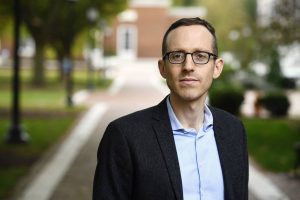The Stavros Niarchos Foundation (SNF) is one of the world’s leading private, international philanthropic organizations, making grants to nonprofit organizations in the areas of arts and culture, education, health, and sports and social welfare. SNF funds organizations and projects worldwide that aim to achieve a broad, lasting, and positive impact for society at large and exhibit strong leadership and sound management. The Foundation also supports projects that facilitate the formation of public-private partnerships as an effective means for serving public welfare.
Stavros Niarchos Foundation Agora Institute Associate Professorship of Health Policy and Management
Bloomberg School of Public Health
Health Policy and Management
Established in 2020 by the Stavros Niarchos Foundation
Held by Adam Seth Levine
Many questions pique ADAM SETH LEVINE’S interest and excitement. The top ones are: “When do ordinary citizens become engaged in civic and political life, and with what impact?” and “How do diverse people work together to address problems in their community?”
A vibrant democracy demands both engagement and collaboration, yet that often does not happen. Why not? What barriers arise, and how can civic organizations and other institutions help overcome these barriers? A common thread throughout his work is that there are often tensions between aspects of human psychology and what civic engagement entails. His research illuminates these tensions in order to improve our understanding of the various ways that new engagement and collaboration can arise.
Initial Research
His initial work focused on one of the core challenges associated with organizing powerful new constituencies: persuading people to voluntarily spend money and/or time on the cause. Here a tension arises because many political issues directly refer to financial and/or time constraints that people are experiencing. Being reminded about these constraints diminishes their willingness to voluntarily spend resources.
He explores this tension with respect to economic insecurity issues (e.g. health care costs, education costs) in his first book, entitled American Insecurity: Why Our Economic Fears Lead to Political Inaction, published with Princeton University Press in 2015. The book was the subject of a NY Times op-ed immediately after its release, and also won a 2016 Best Book Award from the American Political Science Association for how it used experiments and psychology to answer a politically-important question. The book was in part based on his dissertation, which won the E. E. Schattschneider Award for the best dissertation on American government.
Since publishing American Insecurity, he and several co-authors have found that this same tension arises when trying to build powerful constituencies to address other problems such as climate change, the national debt, and traffic congestion.
Current Research
Adam is currently studying the role of science in American life, and in particular when scientists collaborate with civic and political leaders to address pressing public health, environmental, and other challenges (click here for several examples of these findings). Here a tension arises because these collaborations often entail strangers working together, yet many people are hesitant to interact with strangers even if they share interests and concerns. His work identifies key relational factors that, along with effective communication, help spur new successful collaborations. Thanks to generous support from the Rita Allen Foundation, he’s currently devoting substantial time to a new book. The tentative title is Seeking Science: When, Why, and How Community Leaders Bridge a Cultural Divide.
Public Engagement & Teaching
He is deeply committed to broad public engagement. Many of his studies entail formal collaborations with nonprofit organizations, in which they work together to design and carry out studies. Thus far he has collaborated with six nonprofits to conduct research in six countries including the United States, Kenya, Nepal, Mexico, Ecuador, and Vietnam.
He is also the president and co-founder of research4impact, a nonprofit organization that connects researchers, practitioners, and policymakers with similar interests. Thus far he has helped create 200 new collaborations.
In addition to the books mentioned above, he has published peer-reviewed papers in a variety of political science, transportation planning, climate change, communication, law, and economics journals. He regularly gives talks on civic engagement to a wide variety of audiences, including researchers, practitioners, policymakers, students, and grant-makers. A list of recent talks appears on his CV.
His research informs, and is informed by, his teaching. At Johns Hopkins he will be teaching a variety of courses on the links between science, democracy, and health. These will be a combination of BA, MPH, and Ph.D. level courses.
